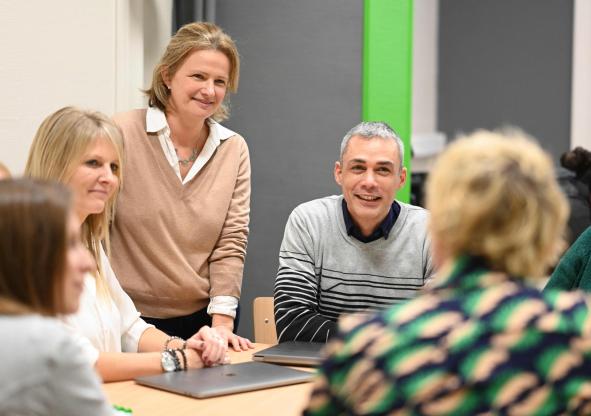Advanced Master in the Training of Teachers
-
Schedule
staggered hours
- ECTS Credits 60

Presentation
Since September 2023, as part of the RFIE, the University of Namur in codiplomation with the Haute École de Namur-Liège-Luxembourg (Hénallux) has been offering the Master of Specialization in Teacher Training. This new diploma replaces the CAPAES in pedagogical sections, for those teaching didactics, pedagogy and training to and through practice.
Target audience
This Master's degree is aimed in particular at future (or current) Hautes Ecoles trainers in charge of UEs linked to didactics, pedagogy and training to and through practice in the Master's programs in teaching sections 1, 2, 3, 4 and 5, who must have this diploma within six years of their first appointment to a position for which this Master's degree is required. After this period, the member of staff may no longer be appointed to this same position or to a position subject to the same requirements.
It may also be of interest, as part of their professional development, to all teacher trainers in continuing education, whether they exercise their mission within inter-network or network continuing education organizations, or as freelancers.
The Master of Specialization in Teacher Training replaces the Certificat d'aptitude pédagogique approprié à l'Enseignement supérieur (CAPAES) for teachers at Hautes Écoles (pedagogical category) who will cover subjects related to didactics, pedagogy and training to and through practice. The CAPAES, as currently organized, will therefore be maintained for teachers in the HE (other categories) and HE (pedagogical category) who will not be tackling these subjects.
Experience in initial teacher training or in-service teacher training is highly recommended.
Objectives
The Master of Specialization in Teacher Education aims for the following competencies:
- mastery of the didactics of the discipline(s) concerned or of didactics applied to these disciplines;
- knowledge and understanding of the training sites within which one will have to practice and of those within which one's future students will practice;
- the ability to accompany people in vocational training situations;
- the mastery of the specificities of pedagogy for adults and young adults in particular;
- the ability to participate in the design of training schemes for teachers and to implement these schemes ;
- the ability to observe, analyze and evaluate elements of professional teaching practice with a view to advising and helping to readjust these practices, drawing in particular on the results of scientific research in education, in the didactics of the subject content to be taught, in psychology, in the sociology of education and in gender studies, concerning in particular cultural diversity, socio-economic inequalities, gender ;
- the ability to conduct, individually and with peers, a critical and rigorous analysis of one's own practices and their impact on students and student success, in particular drawing on various disciplines in the human sciences, in order to regulate one's teaching from a perspective of effectiveness and equity. All of these objectives are part of an epistemological distancing and systemic vision.
The benefits of training
- A dual expertise in teacher training
- UNamur's research and training activities;
- Hénallux's experience in initial training.
- Original pedagogical content and devices
- in university pedagogy;
- in adult education and teacher training in particular;
- in the practice of accompanying and analyzing professional practices;
- in subject didactics and in the didactics of digital tools and school media literacy.
Training based on your professional experience
Your experience is an asset to the training. It will be mobilized to give meaning to learning and create links between theoretical and practical training.
- An organization adapted to your personal situation
- intended for an adult audience;
- possibility, if you work, of spreading courses over several academic years.
Course schedule
Courses are held in Namur from mid-September to mid-May, in the evenings on Tuesdays, Thursdays and some Wednesdays and Saturdays during the day.
Programme partially accessible by distance synchronous.
Free parking access.
Insofar as this Master of Specialization is aimed at working professionals, the program is organized on a staggered timetable and it is possible to consider a lighter schedule to spread the program over two academic years.
Contacts
Faculté des sciences de l'éducation et de la formation
Secrétariat
Place Saint Aubain, 14
5000 Namur
Tél. +32 81 72 50 69
secretariat.fasef@unamur.be
Responsable du programme
Gaëlle Chapelle
Tél. +32 81 72 51 86
gaelle.chapelle@unamur.be
-
<unknown>
-
<unknown>